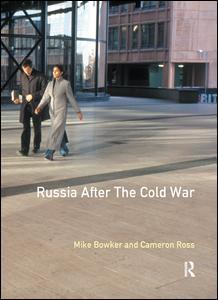Russia after the Cold War
Auteur : Bowker Mike

- Assumes no prior knowledge of the region.
- Comprehensive and authoritative coverage of key issues in Russian politics, economics, society and foreign policy.
- Lively and accessible writing style with numerous boxed inserts and pen portraits of important figures in contemporary Russia.
Date de parution : 08-2017
15.6x23.4 cm
Thèmes de Russia after the Cold War :
Mots-clés :
Single Member Districts; russian; NATO's Nuclear Posture; federation; NATO Review; alexander; NATO Enlargement; lebed; IMF Conditionality; viktor; NATO Membership; chernomyrdin; Yevgeni Primakov; successor; Sovetskaya Rossiya; yegor; Military Expenditure; gaidar; Shock Therapy; liberal; Russian Federation; transition models; Grigori Yavlinsky; democratisation; CIS State; Federalism; East Central European States; Russian economy; Alexei Arbatov; Russian military capability; Viktor Chernomyrdin; Russia's Democratic Choice; Voennaya Mysl; Russian School System; Russian Orthodox Church; NATO Border; Sea Waters; NATO Council; NATO Military Commander; Full NATO Membership



